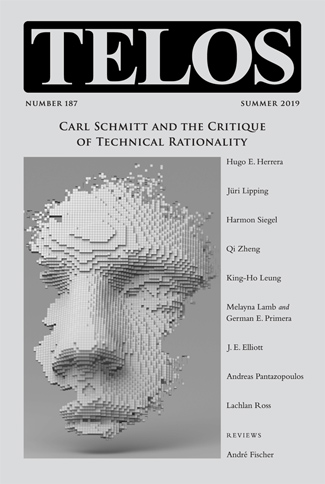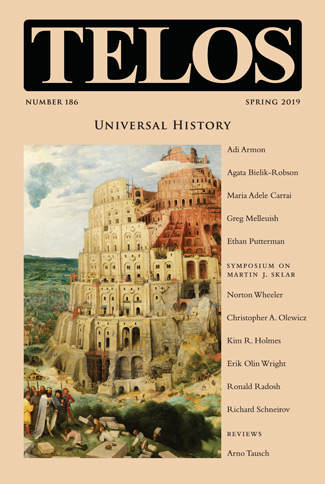In today’s episode of the Telos Press Podcast, David Pan talks with Martin Tomszak about his article “‘With Desire I Have Desired’: Enjoying the Face of the Other as Political Theology: John Caputo and Dorothy Day Situating Hospitality as Divine Encounter,” from Telos 198 (Spring 2022). An excerpt of the article appears here. In their conversation they discuss the basic tenets of the theology of divine weakness, as developed by John Caputo; how this theology arises out of Caputo’s reading of Derrida and his rereading of scripture, specially Luke’s description of the life of Jesus of Nazareth; how Dorothy Day and the Catholic Worker movement translated this theology of divine weakness into practice; how this theology relates to the writings and praxis of Peter Maurin; and how Day and Maurin understood the idea of state sovereignty and why they were opposed to state-sponsored forms of welfare. If your university has an online subscription to Telos, you can read the full article at the Telos Online website. For non-subscribers, learn how your university can begin a subscription to Telos at our library recommendation page. Print copies of Telos 198 are available for purchase in our online store.
|
In today’s episode of the Telos Press Podcast, David Pan talks with Aryeh Botwinick about his article “Contra Originalism: The Elusive Text” from Telos 195 (Summer 2021). An excerpt of the article appears here. In their conversation, they discussed the doctrine of originalism in constitutional theory, the role of the Bible in Western legal and constitutional history, the relation between originalism and skepticism, Derrida’s weak messianism, the way that Derrida’s skepticism undermines itself through the category of the gift, the relationship of originalism to the paradox of sovereignty, and the reason why Hobbes’s statement that “life is motion” is the only defensible phrase. If your university has an online subscription to Telos, you can read the full article at the Telos Online website. For non-subscribers, learn how your university can begin a subscription to Telos at our library recommendation page. Print copies of Telos 195 are available for purchase in our online store. Telos 187 (Summer 2019) is now available for purchase in our store. Individual subscriptions to Telos are also available in both print and online formats. Agata Bielik-Robson’s “Marrano Universalism: Benjamin, Derrida, and Buck-Morss on the Condition of Universal Exile” appears in Telos 186 (Spring 2019). Read the full article at the Telos Online website, or purchase a print copy of the issue in our online store. Individual subscriptions to Telos are available in both print and online formats. The following paper was presented at the 2015 Telos Conference, held on February 13–15, 2015, in New York City. For additional details about the conference, please visit the Telos-Paul Piccone Institute website. In my short essay, I would like to outline a new strategy of the universalization of history, which emerges from the analysis of modern Jewish practice of philosophizing. I call it a Marrano strategy, by building an analogy between the religious practices of the late-medieval Sephardic Jewry, which was forced to convert to Christianity but kept Judaism “undercover,” and the philosophical intervention of modern Jewish thinkers who spoke the seemingly universal idiom of Western philosophy but, at the same time, impregnated it “secretly” with motives deriving from their “particular” background.[1] Yet, they did not do it in order to abolish the universalist perspective, but to transform it; for the last heirs of this “Marrano” line, Walter Benjamin and Jacques Derrida, the proper universalism amounts to an after-Babel project of mending the broken whole from within, horizontally, without assuming the lofty position of a general meta-language, but through the effort of multi-linguality. |
||||
|
Telos Press Publishing · PO Box 811 · Candor, NY 13743 · Phone: 212-228-6479 Privacy Policy · Data Protection Copyright © 2025 Telos Press Publishing · All Rights Reserved |
||||




